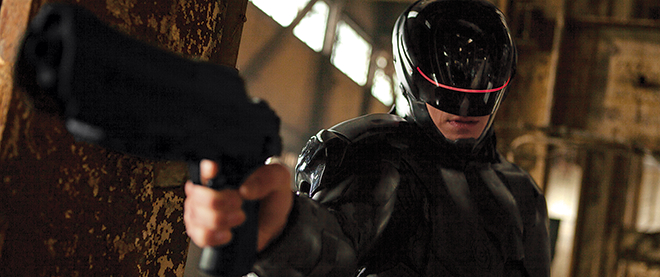RoboCop: What you saw was never what you got
RoboCop 2.0 is less homage than reminder of Paul Verhoeven’s misunderstood genius
Share

In 1987, at the dizzying height of Reaganomics, Paul Verhoeven unleashed RoboCop into the world. Audiences who went in expecting a sci-fi shoot-em-up à la The Terminator got a brutal and bloody (so very bloody) R-rated epic, but also a pointed satire on corporate culture, infotainment and action cinema itself, an odd beast that would go on to populate countless “best films of all time” lists for years to come. This weekend, Columbia Pictures is releasing José Padilha’s remake, starring Joel Kinnaman in the title role and a murderer’s row of character actors playing, well, murderers. With its PG-13 rating, CGI effects and sanded-down satire, RoboCop 2.0 is already being pilloried by fans of the original, who now include elite cineastes. But there is a titanium lining to the story: Whether Padilha’s film sinks or swims, a new generation will be driven to the original, and discover the misunderstood genius of Paul Verhoeven.
The original RoboCop’s bait-and-switch marked a perfect Hollywood introduction for the Dutch filmmaker, who was considered an art-house auteur, not a top-tier action director, back in the Netherlands. “His films operate like Hollywood blockbusters, yet they are meta-blockbusters—they function like regular movies but subvert the many ideas around them, and rather aggressively,” says Jesse Wente, the head of film programmes for the TIFF Bell Lightbox in Toronto, which just launched Flesh+Blood, a Verhoeven retrospective. “On face value, RoboCop is just pure entertainment: guns and explosions. But it’s also a deeply disturbing portrait of why we find movies like that so entertaining.”
That RoboCop—which takes place in a futuristic Detroit laid to waste by bottom-line profiteering—predicted the Motor City’s actual demise is just another example of Verhoeven’s prescience. (Tellingly, the remake, while still set in a dilapidated Detroit familiar to anyone who’s read a newspaper lately, was actually filmed in Toronto.) But while that film established the director’s box-office bona fides, his next project came to define how studios operated for years to come. “Total Recall was essential to setting up what we now understand as the modern blockbuster,” says Wente, noting that the film expertly combines delirious violence with Arnold Schwarzenegger’s trademark brand of audience-rousing one-liners. Nihilistic yet pulse-pounding, Verhoeven’s film created a new prescription for cinematic excess.
Yet the director discovered he could only push Hollywood’s limits so far. In 1995, he raised the curtain on Showgirls, an attempt, along with 1992’s Basic Instinct, to refashion the exploitation genre in much the same way he transformed action movies. “After the success of Basic Instinct, which is so politically incorrect, the knives out for Verhoeven were so gigantic, they weren’t really knives—they were machine guns,” says Adam Nayman, a film critic and author of the new book It Doesn’t Suck: Showgirls, part of a new wave of critical re-evaluations of the infamous flop. “Trying to double down on erotic thrillers with a strong female lead, getting an NC-17 rating: Verhoeven was asking for it. It was the beginning of the end for him in Hollywood.”
The filmmaker tried to tone things down—as best he could—with Starship Troopers (Nazi allegory disguised as space opera) and Hollow Man (moral relativism dressed as horror), but by that point, studio executives had tired of Verhoeven’s cinematic shell game, and the director was effectively banished from Hollywood. (His last major film, 2006’s Second World War drama Black Book, was produced in Europe, while his latest, last year’s Tricked, barely made a ripple on North American shores.) “A lot of the filmmakers who helped define what a Hollywood blockbuster is don’t make movies anymore,” says Wente. “I wonder if an artist like Verhoeven would even find value for himself in the modern Hollywood system, where it’s a challenge to make films on that kind of scale and still retain a singular voice.” Consider 2012’s Total Recall remake, a lightweight exercise in brand nostalgia. If that’s the new studio normal, then perhaps Padilha’s by-the-book remake is simply the RoboCop this generation deserves.